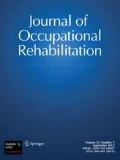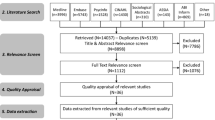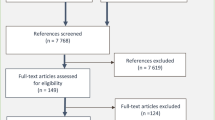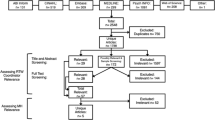Abstract
Purpose We conducted a systematic review to understand the impact that return-to-work coordinators (RTWCs) have on return to work (RTW) outcomes for sick/injured workers. Methods MEDLINE, EMBASE, CINAHL, PsycINFO, Web of Science, and ABI Inform were searched from January 1, 2000 to September 16, 2020. Of 2,927 retrieved and screened citations, 14 quantitative articles fulfilled the eligibility and quality criteria. Quality assessment, data extraction, and evidence synthesis followed article screening. Results We focused on the impact of RTWCs for outcomes of work absence, RTW rates, quality of life, and cost–benefit. Our final synthesis included 14 articles. We found strong evidence that work absence duration was reduced when workers had face-to-face contact with a RTWC. As well, there was strong evidence linking face-to-face RTWC interventions with higher RTW rates and moderate evidence that this reduced intervention costs. RTWC interventions involving the identification of barriers and facilitators to RTW also showed promising results. However, only limited evidence was found that RTWCs improved quality of life for workers. Conclusions Our synthesis identifies key features of RTW interventions that improve RTW outcomes. Future high-quality research should measure long-term outcomes of RTWC interventions to evaluate sustainability and consider the nature of work. They should also focus on RTWC impact on worker quality of life assessments and for older workers and workers with chronic health conditions.

Similar content being viewed by others
Notes
We did not conduct a risk of bias analysis and instead opted for a Best Evidence Synthesis (Slavin [33]) approach, which is more useful for occupational health studies. As well, we did not require blinding, which is typically not possible for occupational health interventions.
References
OECD. Sickness, disability and work: breaking the barriers. a synthesis of findings across OECD countries. OECD Publishing. Paris; 2010. https://www.oecd.org/publications/sickness-disability-and-work-breaking-the-barriers-9789264088856-en.htm. Accessed 1 Nov 2019.
Belin A, Dupont C, Oules L, Kuipers Y, Fries-Tersch E. Rehabilitation and return to work: analysis report on EU policies, strategies and programmes. Luxembourg: Luxemb Publ Off Eur Union; 2016.
OECD. Activation strategies for stronger and more inclusive labour markets in G20 countries: key policy challenges and good practices; 2013. https://www.oecd.org/els/emp/G20-2013ReportActivation.pdf. Accessed 1 Nov 2019.
Viikari-Juntura E, Kausto J, Shiri R, Kaila-Kangas L, Takala E. Return to work after early part-time sick leave due to musculoskeletal disorders: a randomized controlled trial. Scand J Work Environ Health. 2012;38(2):134–143.
Franche RL, Cullen K, Clarke J, Irvin E, Sinclair S, Frank J, et al. Workplace-based return-to-work interventions: a systematic review of the quantitative literature. J Occup Rehabil. 2005;15(4):607–631.
Palmer KT, Harris EC, Linaker C, Barker M, Lawrence W, Cooper C, et al. Effectiveness of community- and workplace-based interventions to manage musculoskeletal-related sickness absence and job loss: a systematic review. Rheumatology. 2012;51(2):230–242.
Liukko J, Kuuva N. Cooperation of return-to-work professionals: the challenges of multi-actor work disability management. Disabil Rehabil. 2017;39(15):1466–1473.
Gouin M, Coutu M, Durand M. Return-to-work success despite conflicts: an exploration of decision-making during a work rehabilitation program. Disabil Rehabil. 2019;41(5):523–533.
MacEachen E, Clarke J, Franche R, Irvin E. Systematic review of the qualitative literature on return to work after injury. Scand J Work Environ Heal. 2006;32(4):257–269.
Cullen KL, Irvin E, Collie A, Clay F, Gensby U, Jennings PA, et al. Effectiveness of workplace interventions in return-to-work for musculoskeletal, pain-related and mental health conditions: an update of the evidence and messages for practitioners. J Occup Rehabil. 2018;28(1):1–15.
Cancelliere C, Donovan J, Stochkendahl MJ, Biscardi M, Ammendolia C, Myburgh C, et al. Factors affecting return to work after injury or illness: best evidence synthesis of systematic reviews. Chiropr Man Ther. 2016;24(1):1–23.
Bohatko-Naismith J, Guest M, Rivett D, James C. Insights into workplace return to work coordinator training: an Australian perspective. Work. 2016;55(1):29–36.
Shaw W, Hong QN, Pransky G, Loisel P. A literature review describing the role of return-to-work coordinators in trial programs and interventions designed to prevent workplace disability. J Occup Rehabil. 2008;18(1):2–15.
Pransky G, Shaw W, Loisel P, Hong Q, Désorcy B. Development and validation of competencies for return to work coordinators. J Occup Rehabil. 2010;20(2):41–48.
Durand M, Nastasia I, Coutu M, Bernier M. Practices of return-to-work coordinators working in large organizations. J Occup Rehabil. 2017;27(1):137–147.
James C, Southgate E, Kable A, Rivett DA, Guest A, Bohatko-Naismith J. The return-to-work coordinator role: qualitative insights for nursing. J Occup Rehabil. 2011;21(2):220–227.
Gardner B, Pransky G, Shaw W, Hong Q, Loisel P. Researcher perspectives on competencies of return-to-work coordinators. Disabil Rehabil. 2010;32(1):72–78.
Corbière M, Mazaniello-Chézol M, Bastien MF, Wathieu E, Bouchard R, Panaccio A, et al. Stakeholders’ role and actions in the return-to-work process of workers on sick-leave due to common mental disorders: a scoping review. J Occup Rehabil. 2019. https://doi.org/10.1007/s10926-019-09861-2.
MacEachen E, McDonald E, Neiterman E, McKnight C, Malachowski M, Crouch S, et al. Return to work for mental ill-health: a scoping review exploring the impact and role of return-to-work coordinators. J Occup Rehabil. 2020. https://doi.org/10.1007/s10926-020-09873-3.
Carroll C, Rick J, Pilgrim H, Cameron J, Hillage J. Workplace involvement improves return to work rates among employees with back pain on long-term sick leave: a systematic review of the effectiveness and cost-effectiveness of interventions. Disabil Rehabil. 2010;32(8):607–621.
Hlobil H, Staal JB, Spoelstra M, Ariëns GA, Smid T, van Mechelen W. Effectiveness of a return-to-work intervention for subacute low-back pain. Scand J Work Environ Health. 2005;31(4):249–257.
Elders LAM, Van der Beek AJ, Burdorf A. Return to work after sickness absence due to back disorders—a systematic review on intervention strategies. Int Arch Occup Environ Health. 2000;73(5):339–348.
Clayton S, Bambra C, Gosling R, Povall S, Misso K, Whitehead M. Assembling the evidence jigsaw: insights from a systematic review of UK studies of individual-focused return to work initiatives for disabled and long-term ill people. BMC Public Health. 2011;11(1):1–12.
Bambra C, Whitehead M, Hamilton V. Does ‘welfare-to-work’ work? A systematic review of the effectiveness of the UK’s welfare-to-work programmes for people with a disability or chronic illness. Soc Sci Med. 2005;60:1905–1918.
Hayday S, Rick J, Carroll C, Jagger N, Hillage J. Review of the effectiveness and cost effectiveness of interventions, strategies, programmes and policies to help recipients of incapacity benefits return to employment (paid and unpaid). In Brighton Institute of Employment Studies. 2008. https://www.nice.org.uk/guidance/ng146/evidence/effectiveness-and-cost-effectiveness-of-interventions-strategies-programmes-and-policies-to-helprecipients-of-incapacity-benefits-return-to-employment-paid-and-unpaid-pdf-6967148223
Schandelmaier S, Ebrahim S, Burkhardt SC, de Boer WE, Zumbrunn T, Guyatt GH, et al. Return to work coordination programmes for work disability: a meta-analysis of randomised controlled trials. PLoS ONE. 2012;7(11):e49760.
Vogel N, Schandelmaier S, Zumbrunn T, Ebrahim S, de Boer WE, Busse JW, et al. Return-to-work coordination programmes for improving return to work in workers on sick leave. Cochrane Database Syst Rev. 2017. https://doi.org/10.1002/14651858.CD011618.pub2.
van Oostrom SH, Driessen MT, de Vet HC, Franche RL, Schonstein E, Loisel P, et al. Workplace interventions for preventing work disability. Cochrane Database Syst Rev. 2009. https://doi.org/10.1002/14651858.CD006955.pub2.
Kuoppala J, Lamminpää A. Rehabilitation and work ability: a systematic literature review. J Rehabil Med. 2008;40(10):796–804.
Higgins J, Thomas J, Chandler J, Cumpston M, Li T, Page M, et al. Cochrane handbook for systematic reviews of interventions. Cochrane handbook for systematic reviews of interventions version 6.1. 2020. www.training.cochrane.org/handbook. Accessed 16 Jul 2019.
Moher D, Shamseer L, Clarke M, Ghersi D, Liberati A, Petticrew M, et al. Preferred reporting items for systematic review and meta-analysis protocols (PRISMA-P) 2015 statement. Syst Rev. 2015;4(1):1–9.
Curtis Breslin F, Kyle N, Bigelow P, Irvin E, Morassaei S, MacEachen E, et al. Effectiveness of health and safety in small enterprises: a systematic review of quantitative evaluations of interventions. J Occup Rehabil. 2010;20(2):163–179.
Slavin R. Best evidence synthesis: an intelligent alternative to meta-analysis. J Clin Epidemiol. 1995;48(1):9–18.
Mallon TM, Cloeren M, Firestone LM, Burch HC. Contract case managers prove cost effective in federal workers’ compensation programs. Mil Med. 2008;173(3):253–258.
Russo D, Innes E. An organizational case study of the case manager’s role in a client’s return-to-work programme in Australia. Occup Ther Int. 2002;9(1):57–75.
Matthews L, Buys N, Randall C, Biggs H, Hazelwood Z. Evolution of vocational rehabilitation competencies in Australia. Int J Rehabil Res. 2010;33(2):124.
Hamer H, Gandhi R, Wong S, Mahomed N. Predicting return to work following treatment of chronic pain disorder. Occup Med (Chic Ill). 2013;63(4):253–259.
Rannard A, Gabbay M, Sen D, Riley R, Britt D. Feasibility trial of GP and case-managed support for workplace sickness absence. Prim Health Care Res Dev. 2014;15(3):252–261.
Høgelund J, Holm A. Case management interviews and the return to work of disabled employees. J Health Econ. 2006;25(3):500–519.
Hepburn C, Kelloway E, Franche R. Early employer response to workplace injury: what injured workers perceive as fair and why these perceptions matter. J Occup Health Psychol. 2010;15(4):409–420.
Selander J, Marnetoft S. Case management in vocational rehabilitation: a case study with promising results. Work. 2005;24(3):297–304.
Marklund S, Lundh G, Gustafsson K, Linder J, Svedberg P, Alexanderson K. The actions of the social insurance agency regarding long-term sickness absentees before and after a medical assessment–a study of 384 case files. Disabil Rehabil. 2015;37(18):1683–1691.
Wang Y, Lin Y. Vocational rehabilitation case manager factors associated with vocational rehabilitation service program outcomes for people with disabilities in Taiwan—an exploratory study. Disabil Rehabil. 2017;39(3):244–250.
Sommer J, Lunt B, Rogers J, Poole R, Singham A. The impact of vocational, education, training and employment coordinator positions on attitudes and practices in a NSW mental health service. Australas Psychiatry. 2012;20(4):295–300.
Beemster TT, van Bennekom CAM, van Velzen JM, Frings-Dresen MHW, Reneman MF. Vocational rehabilitation with or without work module for patients with chronic musculoskeletal pain and sick leave from work: longitudinal impact on work participation. J Occup Rehabil. 2020. https://doi.org/10.1007/s10926-020-09893-z.
Black O, Sim MR, Collie A, Smith P. Early-claim modifiable factors associated with return-to-work self-efficacy among workers injured at work: are there differences between psychological and musculoskeletal injuries? J Occup Environ Med. 2017;59(12):e257–e262.
Scholz S, Andermatt P, Tobler B, Spinnler D. Work incapacity and treatment costs after severe accidents: standard versus intensive case management in a 6-year randomized controlled trial. J Occup Rehabil. 2016;26(3):319–331.
Skarpaas LS, Haveraaen LA, Småstuen MC, Shaw WS, Aas RW. The association between having a coordinator and return to work: the rapid-return-to-work cohort study. BMJ Open. 2019;9(2):1–8.
Tan HS, Yeo DS, Giam JY, Cheong FW, Chan K. A randomized controlled trial of a return-to-work coordinator model of care in a general hospital to facilitate return to work of injured workers. Work. 2016;54(1):209–222.
Van Oostrom SH, Van Mechelen W, Terluin B, De Vet HCW, Knol DL, Anema JR. A workplace intervention for sick-listed employees with distress: results of a randomised controlled trial. Occup Environ Med. 2010;67(9):596–602.
Feuerstein M, Huang G, Ortiz J, Shaw W, Miller V, Wood P. Integrated case management for work-related upper-extremity disorders: impact of patient satisfaction on health and work status. J Occup Environ Med. 2003;45(8):803.
Hara KW, Bjørngaard JH, Brage S, Borchgrevink PC, Halsteinli V, Stiles TC, et al. Randomized controlled trial of adding telephone follow-up to an occupational rehabilitation program to increase work participation. J Occup Rehabil. 2018;28(2):265–278.
Høgelund J, Falgaard EL. Employment effects of a multidisciplinary health assessment for mentally ill persons—a quasi-randomised controlled trial. Scand J Public Health. 2018;46(3):389–399.
Lai HS, Chan CC. Implementing a pilot work injury management program in Hong Kong. J Occup Rehabil. 2007;17(4):712–726.
Lane TJ, Lilley R, Hogg-Johnson S, LaMontagne AD, Sim MR, Smith PM. A prospective cohort study of the impact of return-to-work coordinators in getting injured workers back on the job. J Occup Rehabil. 2018;28(2):298–306.
Nicholas MK, Costa DSJ, Linton SJ, Main CJ, Shaw WS, Pearce G, et al. Implementation of early intervention protocol in Australia for ‘high risk’ injured workers is associated with fewer lost work days over 2 years than usual (stepped) care. J Occup Rehabil. 2020;30(1):93–104. https://doi.org/10.1007/s10926-019-09849-y.
Nuechterlein KH, Subotnik KL, Ventura J, Turner LR, Gitlin MJ, Gretchen-Doorly D, et al. Enhancing return to work or school after a first episode of schizophrenia: the UCLA RCT of individual placement and support and workplace fundamentals module training. Psychol Med. 2020;50(1):20–28.
Oestergaard LG, Christensen FB, Bünger CE, Søgaard R, Holm R, Helmig P, et al. Does adding case management to standard rehabilitation affect functional ability, pain, or the rate of return to work after lumbar spinal fusion? A randomized controlled trial with two-year follow-up. Clin Rehabil. 2020;34(3):357–368.
Berecki-Gisolf J, Clay FJ, Collie A, McClure RJ. Predictors of sustained return to work after work-related injury or disease: Insights from workers’ compensation claims records. J Occup Rehabil. 2012;22(3):283–291.
MacEachen E, Neiterman E, McKnight E, Malachowski C, Crouch M, McDonald E, Dali N, Giau E. The challenging day-to-day situation of RTW coordinators. Work disability prevention and integration conference, Odense, Denmark. June 5–7, 2019.
MacEachen E, Lippel K, Ron S, Agnieszka K, Liz M, Carrasco C, et al. Workers’ compensation experience-rating rules and the danger to workers’ safety in the temporary work agency sector. Policy Pract Heal Saf. 2012;10(1):77–95.
Lay AM, Saunders R, Lifshen M, Breslin C, LaMontagne A, Tompa E, et al. Individual, occupational, and workplace correlates of occupational health and safety vulnerability in a sample of Canadian workers. Am J Ind Med. 2016;59(2):119–128.
Buys N, Selander J, Sun J. Employee experience of workplace supervisor contact and support during long-term sickness absence. Disabil Rehabil. 2019;41(7):808–814.
Acknowledgements
We would like to acknowledge support for this review from the Research Grants Program of the Workplace Safety and Insurance Board of Ontario.
Funding
This study was supported by Project Grant #MACE2018 from the Workplace Safety and Insurance Board (Canada).
Author information
Authors and Affiliations
Corresponding author
Ethics declarations
Ethical Aproval
This article does not contain any studies with human participants performed by any of the authors.
Additional information
Publisher's Note
Springer Nature remains neutral with regard to jurisdictional claims in published maps and institutional affiliations.
Supplementary Information
Below is the link to the electronic supplementary material.
Rights and permissions
About this article
Cite this article
Dol, M., Varatharajan, S., Neiterman, E. et al. Systematic Review of the Impact on Return to Work of Return-to-Work Coordinators. J Occup Rehabil 31, 675–698 (2021). https://doi.org/10.1007/s10926-021-09975-6
Accepted:
Published:
Issue Date:
DOI: https://doi.org/10.1007/s10926-021-09975-6




